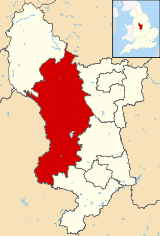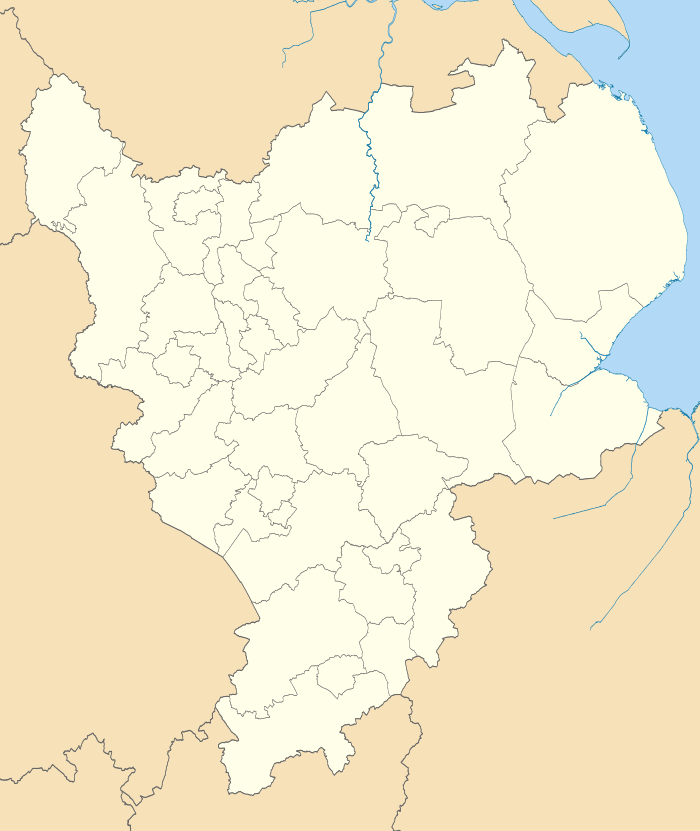Derbyshire Dales
Derbyshire Dales (/ˈdɑːrbiʃər, -ʃɪər/) is a local government district in Derbyshire, England. The population at the 2011 Census was 71,116.[2] Much of it is in the Peak District, although most of its population lies along the River Derwent.
Derbyshire Dales District | |
|---|---|
District | |
 Shown within Derbyshire | |
| Sovereign state | United Kingdom |
| Constituent country | England |
| Region | East Midlands |
| Administrative county | Derbyshire |
| Admin. HQ | Matlock |
| Government | |
| • Type | Derbyshire Dales District Council |
| • Leadership: | Alternative - Sec.31 |
| • Executive: | Conservative |
| • MP: | Sarah Dines |
| Area | |
| • Total | 305.9 sq mi (792.4 km2) |
| Area rank | 47th |
| Population (mid-2019 est.) | |
| • Total | 72,325 |
| • Rank | Ranked 294th |
| • Density | 240/sq mi (91/km2) |
| Time zone | UTC+0 (Greenwich Mean Time) |
| • Summer (DST) | UTC+1 (British Summer Time) |
| ONS code | 17UF (ONS) E07000035 (GSS) |
| Ethnicity | 97.8% White 0.8% .Asian[1] |
| Website | derbyshiredales.gov.uk |
The borough borders the districts of High Peak, Amber Valley, North East Derbyshire and South Derbyshire in Derbyshire and also Sheffield in South Yorkshire. The district also lies within the Sheffield City Region, and the district council is a non-constituent partner member of the Sheffield City Region Combined Authority. A significant amount of the working population is employed in Sheffield and Chesterfield.
The district offices are in Matlock. It was formed on 1 April 1974, originally under the name of West Derbyshire. The district adopted its current name in 1988. The district was a merger of Ashbourne, Bakewell, Matlock and Wirksworth urban districts along with Ashbourne Rural District and Bakewell Rural District.
Following their review of parliamentary representation in Derbyshire, the Boundary Commission for England has formed a new constituency called Derbyshire Dales.
Governance
Derbyshire Dales District Council is elected every four years, with currently 39 councillors being elected at each election. The Conservative party has had a majority on the council since 1976, apart from a four-year period between 1995 and the 1999 election when no party had a majority. As of May 2019 and after the 2019 election the council is composed of the following councillors:-[3]
| Party | Councillors | |
| Conservative Party | 20 | |
| Liberal Democrats | 8 | |
| Labour Party | 6 | |
| Independent | 3 | |
| Green | 2 | |
Places
- Alsop-en-le-Dale, Ashford-in-the-Water, Ashbourne
- Bakewell, Baslow, Beeley, Biggin, Birchover, Bonsall, Bradbourne, Bradwell, Brailsford, Brassington, Bretton
- Calver, Carsington, Chatsworth, Chelmorton, Cromford, Curbar
- Darley Dale, Doveridge
- Earl Sterndale, Edensor, Elton, Eyam
- Fenny Bentley, Foolow, Froggatt
- Great Hucklow, Great Longstone, Grindleford
- Hassop, Hathersage, Hognaston, Hartington
- Kirk Ireton, Kniveton
- Little Hucklow, Litton
- Matlock, Matlock Bath, Middleton-by-Wirksworth, Middleton-by-Youlgreave, Monyash
- Over Haddon
- Parwich
- Rowsley
- Stanton-in-Peak, Stoney Middleton, Sudbury
- Taddington, Tansley, Thorpe, Tideswell, Tissington
- Wardlow, Wensley, Winster, Wirksworth
- Youlgreave
References
| Wikimedia Commons has media related to Derbyshire Dales District. |
- "Resident Population Estimates by Ethnic Group (Percentages) Area: Derbyshire Dales (Local Authority)". Neighbourhood Statistics. National Office for Statistics. Retrieved 2 August 2015.
- "Local Authority population 2011". Neighbourhood Statistics. Office for National Statistics. Retrieved 23 March 2016.
- "District Council Elections 2019". BBC News. Retrieved 4 May 2019.
